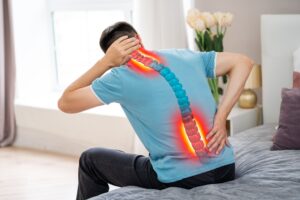A spinal disc herniates when a concentrated amount of stress causes the soft inner disc material to break through the tough fibrous outer layer. It takes a lot of strain for a disc to herniate, but that doesn’t mean discs only herniate during traumatic collisions, like during athletics or a car accident. You can herniate a disc when bending, twisting, lifting or even sneezing, and oftentimes there are warning signs that suggest these rather innocent actions could be the tipping point for a disc herniation. In today’s blog, we take a closer look at five warning signs that one of your spinal discs may be about to herniate.
Signs That A Disc Herniation May Be In Your Future
If you’re dealing with any of these symptoms or issues, consider talking with a spine specialist like Dr. Jackman or making a few lifestyle changes to take some stress off your spine.
- Localized Pain – Localized back pain in and of itself doesn’t necessarily mean that your disc is about to herniate. A number of other minor back issues like strains or sprains will be uncomfortable or even painful, but localized pain can be a sign that a spinal disc is struggling to handle the stress you are putting on it.
- Pressure – If you feel like there is a pressure point along your spine, this could be an indication of a weakening spinal disc. This sensation may present with or without pain, but it will be uncomfortable nonetheless.
- Weakness – Another sign that your spine is struggling to handle the amount of stress that you are putting on it is weakness. If you’re finding that certain actions are becoming harder to perform, or you no longer trust your back to be able to handle specific actions like lifting a box off the ground or bending over, it may be due to weakness in one or more of your spinal discs.
- Decreased Flexibility – Like other symptoms on this list, a loss in flexibility or spinal range of motion does not mean that there is definitely a problem with a spinal disc, but in combination with one or more symptoms on this list, it may help to paint a picture of your overall spine health. If you’re dealing with pain, weakness and a loss of flexibility in your spine, you’re likely at a heightened risk for herniation if you put too much stress on your back.
- Worse With Movement – Finally, if any of these symptoms begin to intensify with movement or certain spinal motions, your back could be trying to tell you that it is close to being overstressed. If the above symptoms worsen with exercise, when you’re slouching on the couch or while you’re using the bathroom, you may be at risk for a spinal disc herniation.
As we’ve talked about numerous times on the blog in the past, prevention is much preferred to treatment, and since you haven’t yet herniated your disc, there’s still time to take some simple steps to improve your spine health. Pursue some low impact forms of exercise, eat a range of healthy foods to ensure your body gets the nutrients it needs to thrive, lose some weight to take some pressure off your spine and be cognizant of your posture throughout the day. If you make these small adjustments and avoid overly strenuous movements, we’re confident that your spinal discs will be better equipped to handle the stress you throw at them, and this will lower your risk of a herniated disc.
For more tips on how you can prevent disc herniations, or if you need help treating a specific disc issue, reach out to Dr. Jackman and the team at The Midwest Spine & Brain Institute today at (651) 430-3800.


 Vertebroplasty And Kyphoplasty – Which One Is Right For You?
Vertebroplasty And Kyphoplasty – Which One Is Right For You?